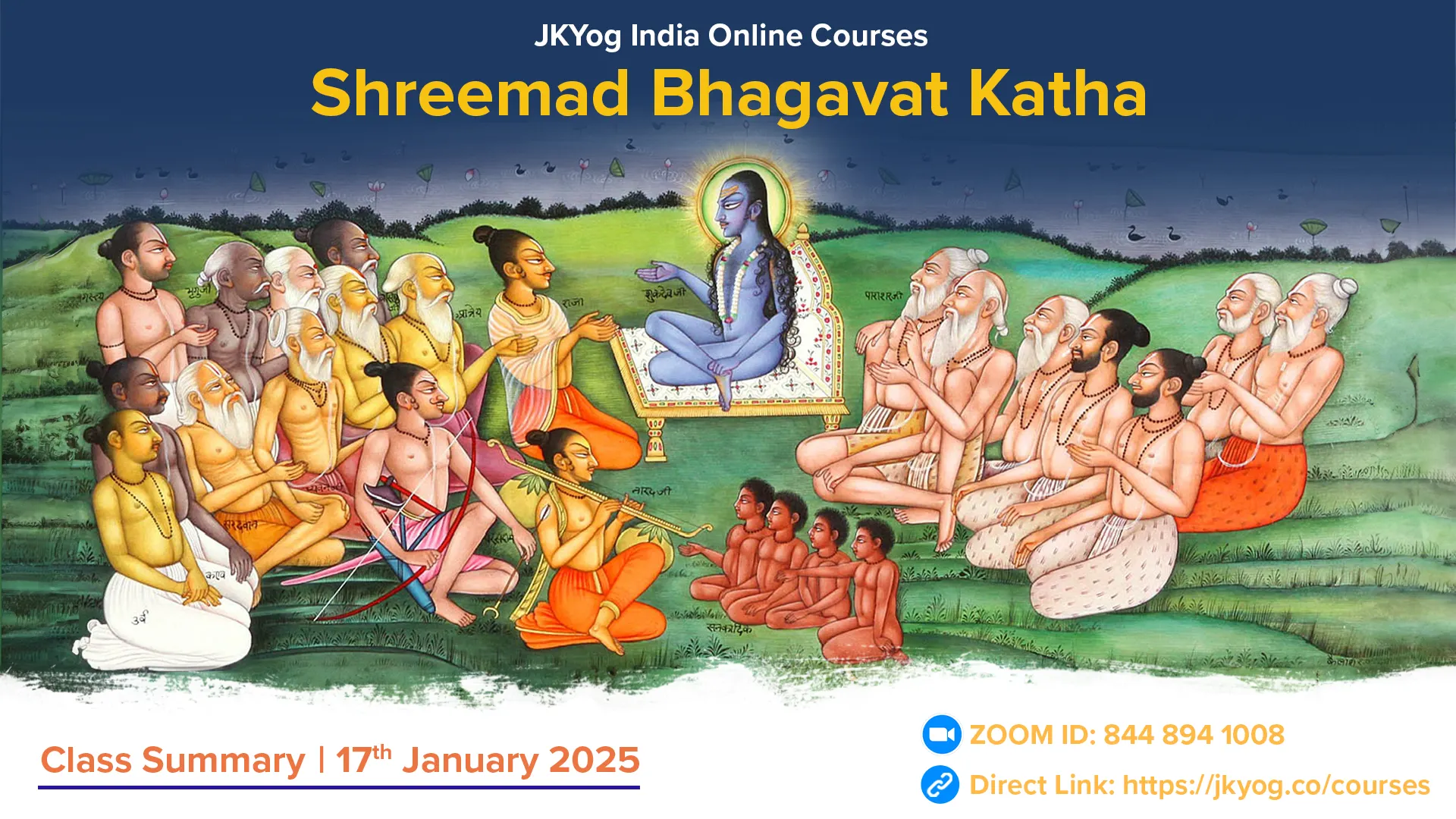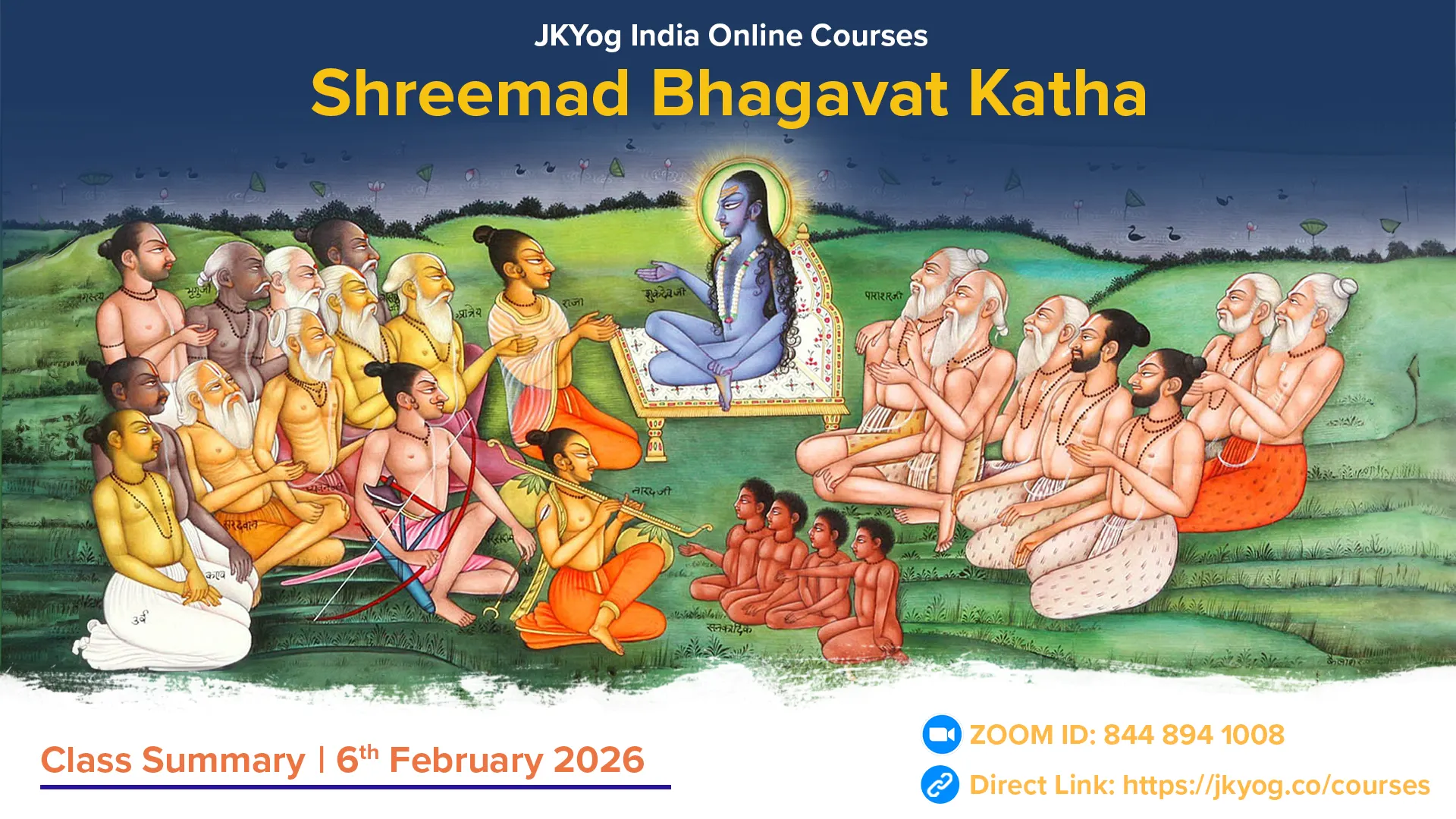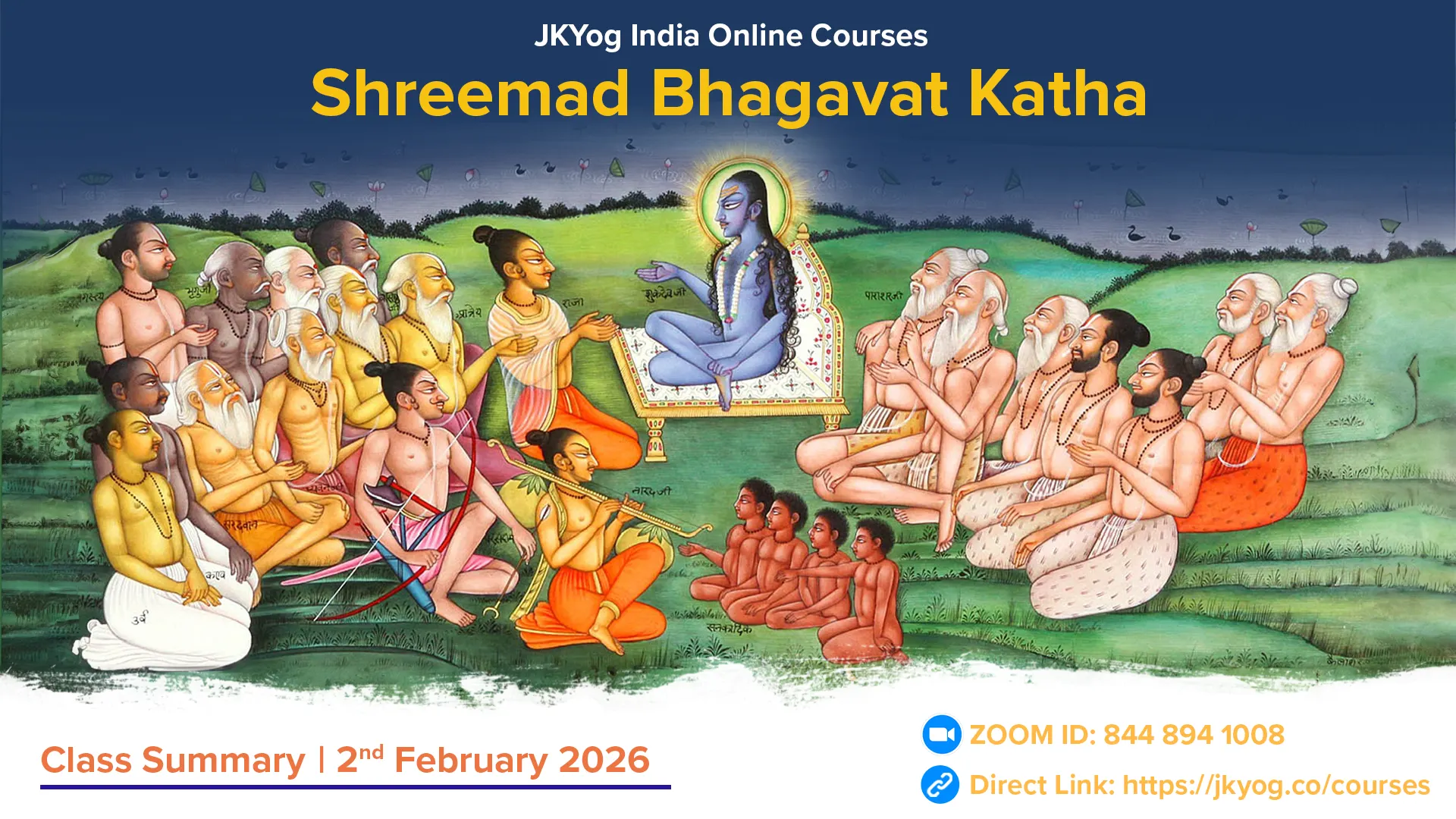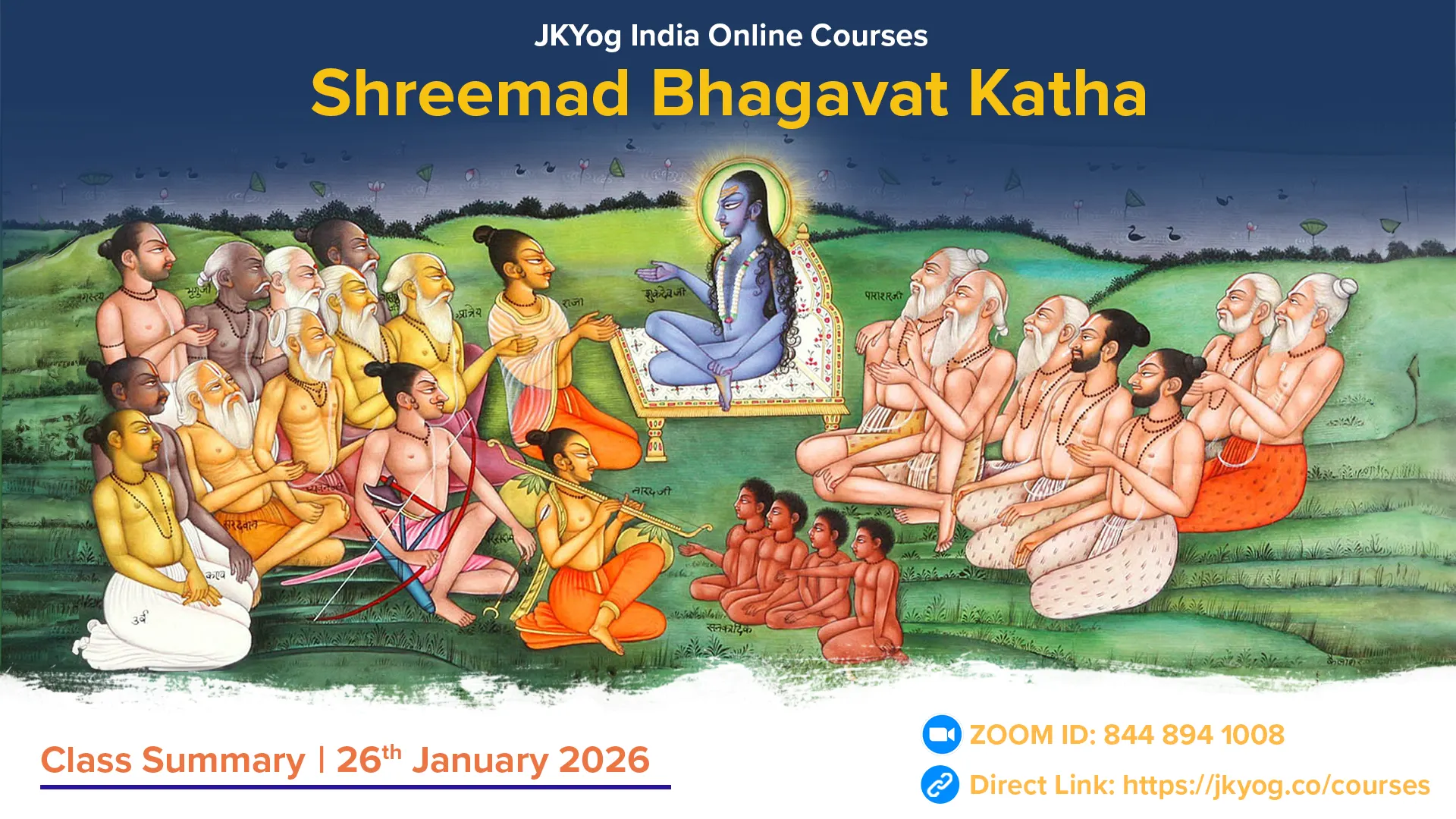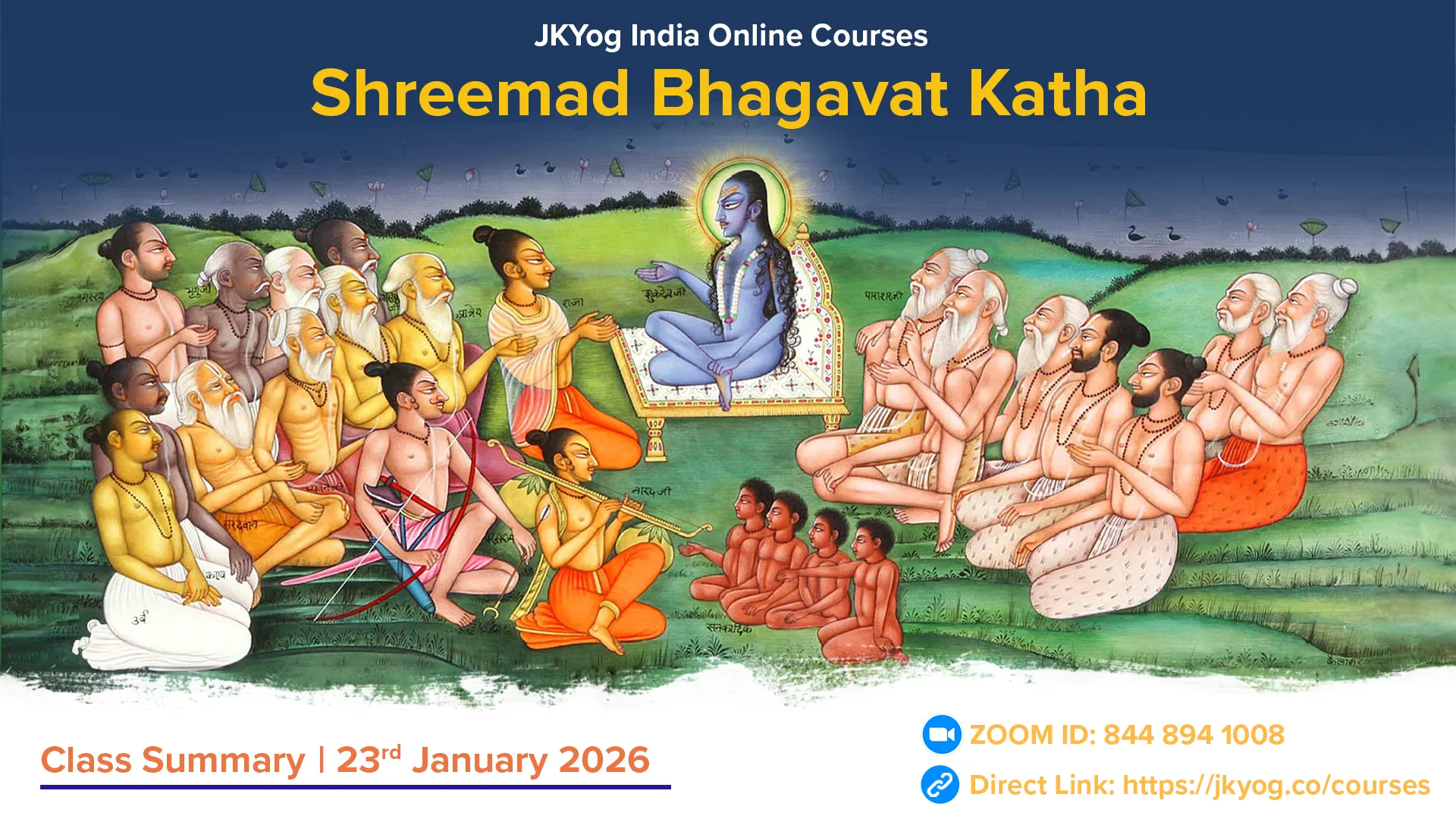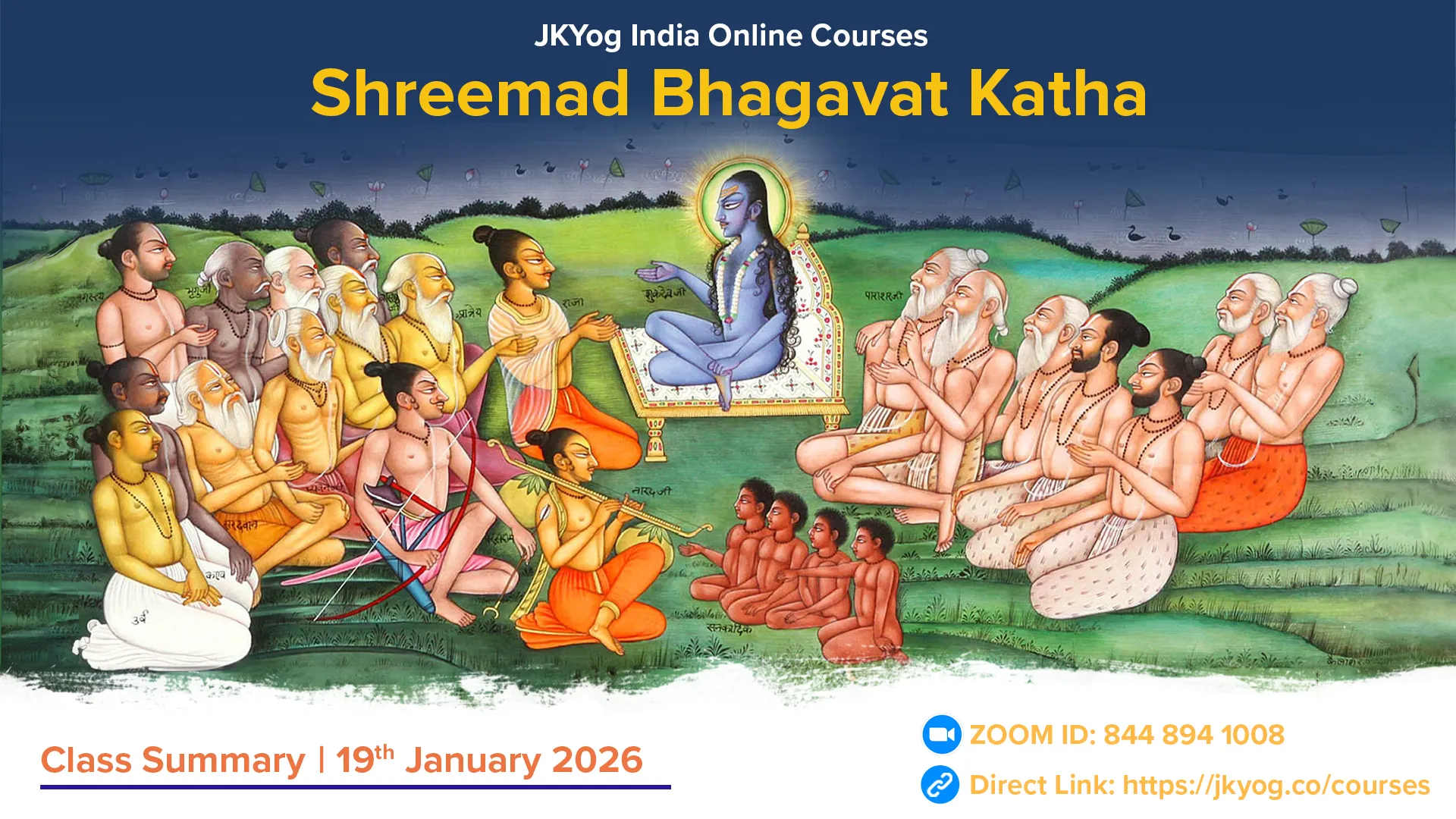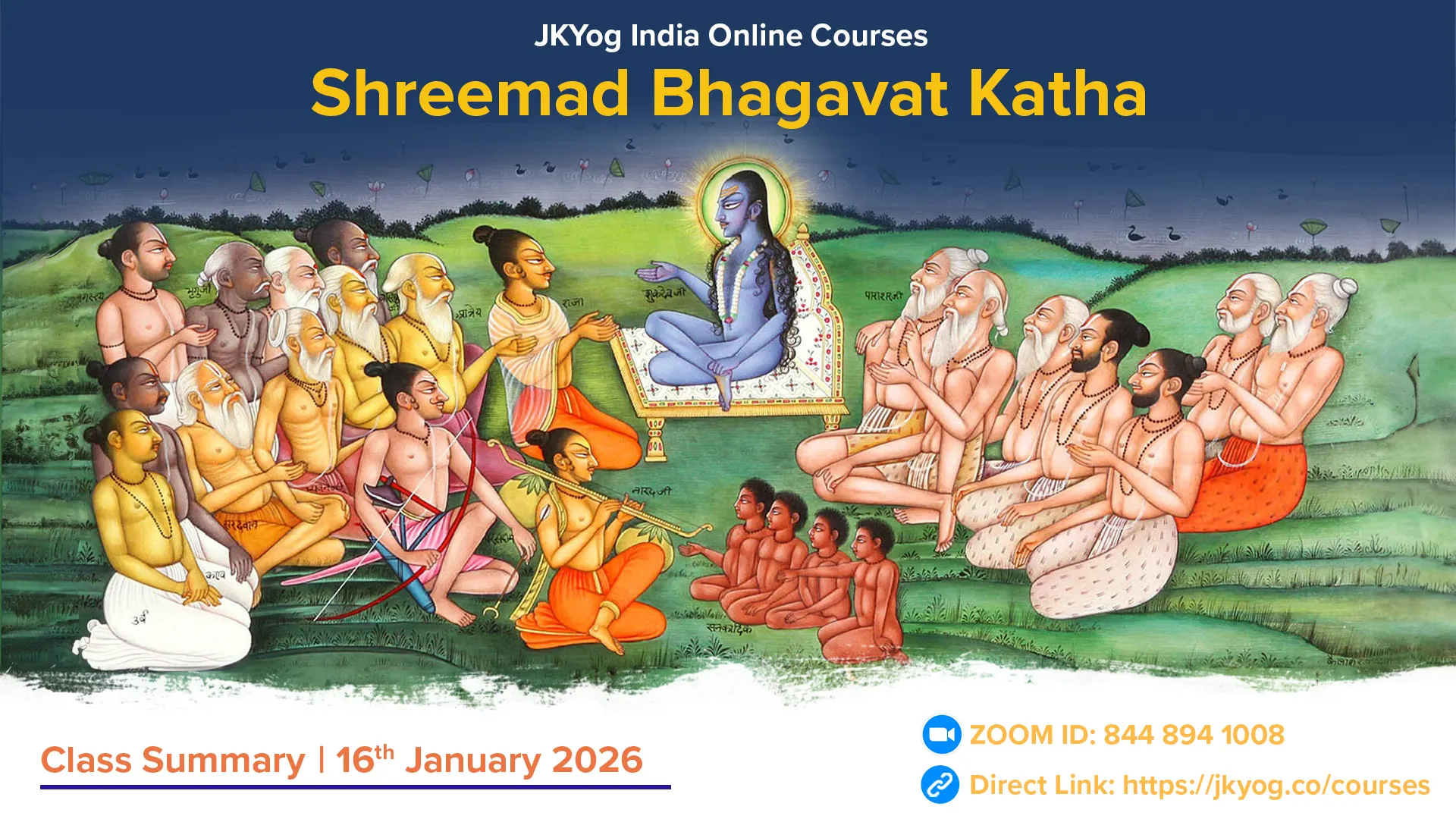Shreemad Bhagavat Mahapuran- Canto: 5, Chapters: 10-12
Once, King Rahugan, the ruler of the Sindhusauvira kingdom, was travelling in a palanquin. Near the banks of the Ikshumati River, they needed an additional bearer to carry the palanquin. Coincidentally, Jadbharat was there. Seeing his robust physique, they asked him to help carry the palanquin.
As Jadbharat walked, he carefully avoided stepping on any living creatures, which caused the palanquin to sway. The king remarked, “Bearers, carry the palanquin properly!” The other bearers informed the king that the new bearer wasn’t walking properly. Sarcastically, the king said to Jadbharat, “Oh, brother! It seems you are terribly exhausted. Surely, your companions have given you no assistance. You’ve been carrying this palanquin all alone for a long distance. Your body isn’t particularly sturdy, and, my friend, your old age seems to have taken a toll on you.” Unperturbed by the king’s sarcasm, Jadbharat continued walking as before. When the swaying persisted, the king grew angry and threatened to punish Jadbharat. In his pride as a king, Rahugan insulted the great soul, Jadbharat.
Seeing the king’s ignorance, Jadbharat smiled and, without any pride, calmly responded, “O King, what you say is true, and I take no offence. Attributes like physical strength, frailty, disease, hunger, thirst, fear, anger, etc., arise from bodily identification, not the soul. The wise do not get entangled in such matters. These feelings arise due to the body, but they have no effect on me. Life and death are inherent properties of all things because every creation has a beginning and an end. You mentioned master and servant but from the perspective of the ultimate truth, who is the master, and who is the servant? Still, if you consider me your servant, please tell me how I can serve you. I remain content and unmoved in my state. Attempting to reform me is futile because teaching me is pointless if I am truly inert.”
Shukdevji narrated, “Parikshit, after imparting this wisdom about the ultimate truth, the sage Jadbharat fell silent. The king’s ignorance, born of bodily identification, dissipated. Rahugan, now at peace, resumed carrying the palanquin as before. However, Rahugan, being sincere and inquisitive, was qualified to receive the knowledge of truth. Hearing Jadbharat’s profound teachings, the king’s pride dissolved. He descended from the palanquin, fell at the sage’s feet, and begged forgiveness for his offences.
King Rahugan said, “O revered one! You wear the sacred thread; please reveal your true identity. Are you Dattatreya or some other avadhut? Where have you come from, and what is your origin? Are you the Supreme Being, Bhagwan Kapil, who has come for our welfare? I fear not the thunderbolt of Indra, the trident of Bhagwan Shiv, or the punishment of Yamraj. I do not fear the weapons of fire, the sun, the moon, the wind, or Kuber. But I greatly fear offending a Brahmin. Your wisdom and asceticism leave me astonished. You appear utterly detached from worldly pleasures. Yet your words, filled with Yogic wisdom, leave my doubts unresolved. Just as the heat of a stove cooks the water and rice in a pot, so too does the soul experience the effects of the body, senses, and mind.
You said punishment is futile, but a king is the servant and protector of his subjects. Punishing the wicked is not useless; it is upholding Dharma and serving Bhagwan. This purges sins. Overcome by my royal arrogance, I insulted a saint like you. Please forgive me and free me from this sin. Though you are beyond bodily identification and unaffected by honour or insult, offending a saint inevitably leads to ruin. I beg your forgiveness.”
Jadbharat replied, “O King! Though you speak eloquently, your understanding of the ultimate truth lacks depth. True knowers of the ultimate reality do not consider distinctions like master and servant as absolute truths. Just as worldly dealings are illusory, so too are Vedic rituals not entirely true. The Vedas primarily describe rituals for householders, but even they do not fully express the pure knowledge free from attachment and aversion. Even the Upanishads find it challenging to impart the knowledge of truth to those who do not renounce worldly rituals and heavenly pleasures.
As long as the mind is influenced by the three gunas (modes of material nature—sattva, rajas, tamas), it compels the senses to perform actions, good or bad. This mind, full of desires and attached to sense objects, is the root cause of a being’s elevation or degradation. The mind, born of Maya, entangles the soul in the cycle of birth and death. Under its influence, the soul becomes bound by joy, sorrow, and delusion.
A mind attached to worldly objects leads the soul into suffering, while a detached mind grants peace and liberation. Just as a ghee-soaked wick burns with smoke but merges into its essence once the ghee is consumed, so too does a mind entangled in material pursuits. When freed from such entanglements, it returns to its true self.”
Ekadasha asan manaso hi vrttaya
Akutaya pancha dhio'bhimanaah
Maatraani karmaani puram cha taasham
Vadanti haikadasha veera bhoomih.
Gandhaakrti sparsha rasa shravamsi
Visarga ratyartya bhijalpa shilpaah
Ekadasha sveekaranam mameti
Shayya mahaam dvadasha meka aahuh.
The mind has eleven tendencies—five jnanendriyas (organs of perception), five karmendriyas (organs of action), and ahankar (ego). Based on these, there are eleven subjects:
- Jnanendriyas: Eyes, ears, nose, tongue, and skin, whose subjects are smell, form, touch, taste, and sound.
- Karmendriyas: Hands, feet, mouth, excretory organs, and reproductive organs, whose functions are excretion, movement, speech, giving and taking, and reproduction.
- The subject of ahankar is identifying the body as "this is mine."
Some consider ahankar as the twelfth tendency of the mind and the body as the twelfth subject. (Bhagavat 5.11.9-10)
The eleven tendencies of the mind (jnanendriyas, karmendriyas, and ahankar) undergo countless transformations due to dravya (matter), swabhav (nature), sanskar (impressions from the past), karm (actions), and kaal (time). However, their existence is powered by the atma (knower of the field or Kshetrajna). These tendencies cannot function independently, either by themselves or in combination.
Despite this, the atma has no direct relationship with the mind. The mind is a conditioning (upadhi or covering) the maya creates. It is often engrossed in impure actions, which become the cause of worldly bondage.
The tendencies of the mind flow like a constant stream—they manifest in the waking and dream states while they remain dormant in deep sleep (sushupti). However, the Kshetrajna, which is pure and of the nature of consciousness, observes these tendencies with detachment at all times, without being influenced by them.
Kshetrajna atma purushah puranah
Sakshat svayam jyotirajah pareshah
Narayanah bhagavan vasudevah
Swamayayatmanyavadhiyamanah.
This kshetrajna (knower of the field) is Paramatma, the Supreme Soul—omnipresent, the primal cause of the universe, complete, direct, self-luminous, unborn, the controller even of Brahma and others, and the one who, through maya under His control, resides in the hearts of all beings, inspiring them. He is the refuge of all living entities and is none other than Bhagwan Vasudev. (Bhagavat 5.11.13)
Yathanilah sthavara jangamaanam
Atmaswaroopena nivishtah Ishat
Evam paro bhagavan vasudevah
Kshetrajna atmedamanupavishtah.
Just as air enters all stationary and moving beings as the life force and animates them, in the same way, Bhagwan Vasudev, the Supreme Being, pervades the entire creation as the all-seeing, self-luminous soul. (Bhagavat 5.11.14)
Na yaavadetam tanubhrin nendra
Vidhuya mayam vayunodayena
Vimuktasangho jitashatspatno
Vedatmatattvam bhramatiha taavat.
Na yaavadetanmana atmalingam
Sansaratapavapanam janasya
Yacchokamohamayaragaloha
Vairanubandham mamataṁ vidhatte.
O King! Until a person, through the awakening of knowledge, renounces maya gives up all attachments, conquers the six enemies (kama, krodha, etc.), and realises the essence of the self (atmatattva), and until he recognises the mind—an adjunct of the soul—as the field of worldly suffering, he continues to wander aimlessly in this world. This restless mind perpetuates impressions of sorrow, delusion, disease, attachment, greed, and enmity, thereby increasing a sense of possessiveness. (Bhagavat 5.11.15-16)
Bhratra vyamenam tada dabhra viryyam
Upekshaya adhyedhitam apramatta
Guroh hareh charano pasaanaastro
Jahi vyaleekam svayam aatmamosham.
This mind is indeed your powerful enemy. Its strength has increased because of your neglect. Although it is entirely false by nature, it has veiled your true self. Therefore, be vigilant and slay this enemy using the weapon of devotion at the lotus feet of Shree Guru and Bhagwan Hari. (Bhagavat 5.11.17)
King Rahugan bows to Jadbharatji and says, "O revered one, you have taken this body for the welfare of the world and concealed your blissful and knowledgeable true form under the guise of a simple Brahmin. Your words are like nectar to me, as my wisdom had been afflicted by the poison of body identification. I deeply desire to understand the spiritual teachings you have imparted. In particular, you mentioned that the act of carrying burdens and the resulting labour are merely practical and hold no truth before the ultimate reality. This concept eludes me; please explain it in simpler terms."
Jadbharat responds to the king, "O King, this body is merely a transformation of the Earth, akin to a stone. When it moves, it is assigned labels like 'bearer of burdens.' Its parts—ankles, knees, waist, neck, and shoulders—are all parts of the Earth. The palanquin placed on the shoulders is also a product of the Earth, and the one seated within it, the king, is likewise a part of it. Your ego, 'I am the king,' blinds you but does not prove your superiority. In fact, by forcing these poor carriers into labour, you have committed injustice. Merely calling yourself a protector of the people does not justify such behaviour.
Everything in this world arises from the Earth and ultimately merges back into it. These distinctions and names are merely for transactional purposes, not absolute reality. The Earth, its elements, and all forms in the world are manifestations of Bhagwan's maya. They possess no independent existence of their own. All of this is the play of maya, where every object and name is just an illusion."
Jnanam vishuddham paramartham ekam
Anantaram tvabahir brahmam satyam
Pratyak prashantam bhagavacchabda sanjnam
Yad Vasudevam kavayo vadanti.
The pure, ultimate reality, which is unparalleled, devoid of any distinction between inner and outer, and absolute in its knowledge, is the only true entity. It is all-pervading and entirely unchanging. This is what is called 'Bhagwan,' and the wise refer to Him as 'Vasudev.' (Bhagavat 5.12.11)
Rahugana itat tapasaa na yaati
Na che jyaa nirvapanad grihaadvaa
Na chandasaa naiva jalaagni sooryair
Vina mahat paadarajo'bhishekam.
My dear King Rahugan, one is blessed with the realisation of the Absolute Truth when one smears his entire body with the dust of the lotus feet of true selfless devotees. The Absolute Truth cannot be realised merely through external practices such as strict celibacy, rigid adherence to the rules of householder life, renouncing home as a vanaprastha, accepting sanyas, or performing severe austerities—whether by submerging oneself in freezing water during winter or enduring the blazing heat of fire and the summer sun. While many paths are prescribed for understanding the Absolute Truth, it is only revealed to the one who has received the grace and mercy of a great devotee, for their association is the true gateway to God-realisation. (Bhagavat 5.12.12)
Aham pura bharato nama raja
Vimuktadrshtashrutasangabandhah
Aradhanam bhagavat ihamano
Mrigo’bhavam mrigasangaddhatarthah.
In my previous birth, I was a king named Bharat. Despite being detached from worldly and otherworldly pleasures, I devoted myself entirely to worshipping Bhagwan. Yet, due to developing an attachment to a deer, I deviated from the ultimate truth and was born as a deer in my next life. (Bhagavat 5.12.14)
Sa mam smritirmrigadehe'pi veera
Krishnarchanaprabhava no jahati
Atho aham janasangadasango
Vishankamano'vivritashcharami.
However, due to the influence of my worship of Bhagwan Shree Krishna, I did not lose the memory of my past life, even in the deer form. As a result, I now avoid worldly associations and always wander secretly, maintaining a sense of detachment. (Bhagavat 5.12.15)
Tasmaan naro'sangasusangajaat
Gyaanaseenehaiva vivriknamohaḥ
Harim tadaihaakathanashrutaabhyaam
Labdhasmritiryaatyatipaaramadhvnah.
The summary is that with the knowledge gained from the association of detached saints, a person should cut through the bondage of attachment in this world with the sword of wisdom. Then, by continually remembering Bhagwan through narration and listening to His divine pastimes, one can easily transcend the path of worldly life and attain Bhagwan. (Bhagavat 5.12.16)
Summary: JKYog India Online Class- Shreemad Bhagavat Katha [Hindi]- 17.01.2025

